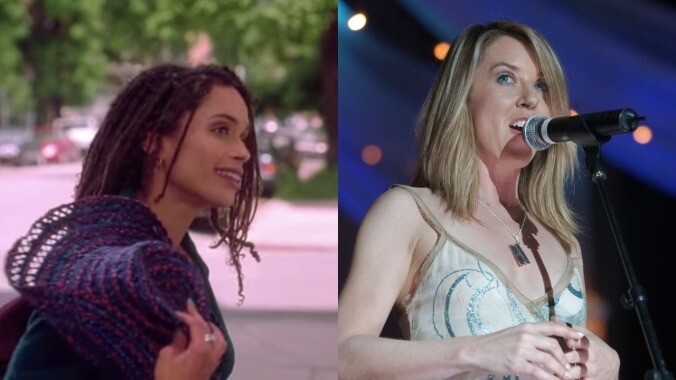Liz Phair nearly played Lisa Bonet's role in High Fidelity

Consequence Of Sound just published an excellent, in-depth oral history of High Fidelity for the film’s 20th anniversary, speaking to everyone from author Nick Hornby, director Stephen Frears, screenwriters DV DeVincentis, John Cusack, and Steve Pink to cast members like Jack Black, Todd Louiso, and Iben Hjejle.
There’s plenty of big takeaways from the piece, including a wild breakdown of how writer Scott Rosenberg was credited as a screenwriter despite not having written a word of the final script. What made us perk up, however, was hearing that iconic songwriter Liz Phair nearly ended up playing Marie De Salle, the role that eventually went to Lisa Bonet.
“I remember that we initially focused on the possibility of finding a real singer to do the role of Marie. Like a musician. I was really pushing for Liz Phair because she and I were old friends from North Chicago,” said DeVincentis. “And I thought Liz would kill it. She became one of the more important musicians to come out of Chicago in the ’90s. So, we actually had a read through of the script in Chicago with Liz reading the role. We did it at Joanie Cusack’s house. And she was totally great. And we’re like, ‘She’s an actress. Oh my God.’”
Fortunately for Bonet, the team eventually decided Phair wasn’t right for the role, though her song “Baby Got Going” did end up on the soundtrack.
The team behind the film also discuss axed cameos from Harold Ramis and Beverly D’Angelo (watch hers below), as well as how Bruce Springsteen made his brief appearance in the film that much more powerful with the addition of a single word: “Maybe.”
Also intriguing is Black, whose turn as Barry—one that would play a huge role in him becoming a household name—almost didn’t happen. “I was just worried that, at the time, Tenacious D had a full head of steam, and we were getting great crowds and were playing to big houses. And I had, in my mind, a legitimate rock and roll career, separate from film and television, that I wanted to protect,” he said. “And to do a movie about music, playing sort of a music critic and talking about some of my heroes like Kurt Cobain … just all those elements made me nervous about messing with this thing that was my own little crown jewel of my life and career up to that moment. I was hesitant to fuck with that.”
It was Frears who eventually convinced Black to join the cast. In Black’s words:
If I’m really being honest with myself, I was terrified of failing. I was terrified of being bad in this movie and also terrified of working with Stephen Frears. I had seen Dangerous Liaisons like 12 times, mainly because I was obsessed with John Malkovich. I really wanted to be John Malkovich. But he was clearly a master, and I was intimidated that I wasn’t good enough as an actor to pull it off. So I said, “I’m gonna pass.”
But Stephen called me in, even though I had passed. He said, “Get in here. I want to talk to you.” We talked about it a little bit. I told him about my fears, and he just thought it was funny that I was passing. Because it was obvious to him and to anyone in my life that this was a no-brainer. And it would be a huge mistake to bail on it for any reason other than I just didn’t like it. And that was not the case. I loved the script and I loved Stephen and I realized that I was just passing on it out of fear. And that was not a good reason. And so I said, “Okay, I’ll do it.”
CoS also interviewed Veronica West and Sara Kucserka, the creators of Hulu’s High Fidelity reboot series, and asked the screenwriters what they think of the show. Turns out they were surprised to find so much of their own work in it, given that they weren’t credited.
DEVINCENTIS: I didn’t see the TV show. I read the pilot, and I was kind of stunned to find our writing in their script. Like, a lot of it. Just lifted from the screenplay of the movie and dropped down into the TV show. I’d never seen anything like it.
PINK: They really embraced our vision and took it further in some ways and spun it in other ways, and good for them. The problem is that it’s a remake of our movie. It’s not not a remake. You can’t look at the TV show and look at our movie and think that the TV show was not a remake. I don’t know how with an honest face you could make that determination.
DEVINCENTIS: The TV show was supposedly an adaptation of the book, not an adaptation of the movie—that’s what the credits say. Yet, there were entire scenes, concepts, shots, and dialogue lifted directly from the movie — again not from the book — without any credit or attribution. Like, even an Easter egg in-joke I laid in to a record store scene for a friend — the meaning of which the TV writers could never know — was simply lifted and dropped into their teleplay with the rest of it.
Read the full oral history here.
Send Great Job, Internet tips to [email protected]